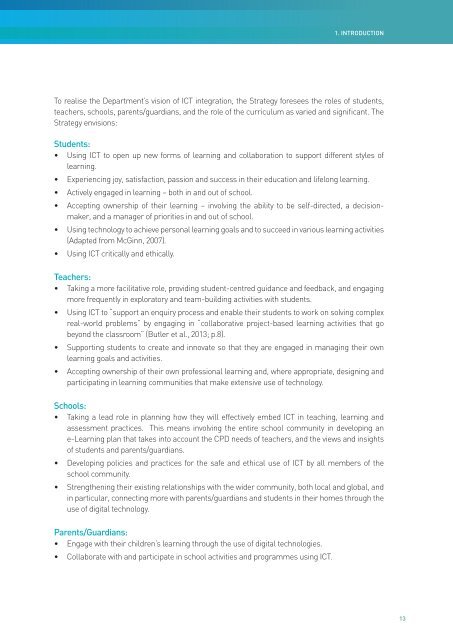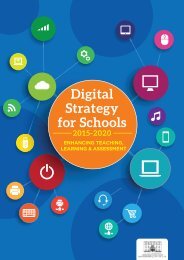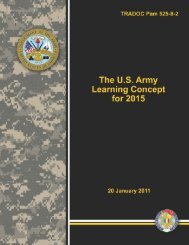Digital Strategy for Schools
TKmef
TKmef
Create successful ePaper yourself
Turn your PDF publications into a flip-book with our unique Google optimized e-Paper software.
1. INTRODUCTION<br />
To realise the Department’s vision of ICT integration, the <strong>Strategy</strong> <strong>for</strong>esees the roles of students,<br />
teachers, schools, parents/guardians, and the role of the curriculum as varied and significant. The<br />
<strong>Strategy</strong> envisions:<br />
Students:<br />
• Using ICT to open up new <strong>for</strong>ms of learning and collaboration to support different styles of<br />
learning.<br />
• Experiencing joy, satisfaction, passion and success in their education and lifelong learning.<br />
• Actively engaged in learning – both in and out of school.<br />
• Accepting ownership of their learning – involving the ability to be self-directed, a decisionmaker,<br />
and a manager of priorities in and out of school.<br />
• Using technology to achieve personal learning goals and to succeed in various learning activities<br />
(Adapted from McGinn, 2007).<br />
• Using ICT critically and ethically.<br />
Teachers:<br />
• Taking a more facilitative role, providing student-centred guidance and feedback, and engaging<br />
more frequently in exploratory and team-building activities with students.<br />
• Using ICT to “support an enquiry process and enable their students to work on solving complex<br />
real-world problems” by engaging in “collaborative project-based learning activities that go<br />
beyond the classroom” (Butler et al., 2013; p.8).<br />
• Supporting students to create and innovate so that they are engaged in managing their own<br />
learning goals and activities.<br />
• Accepting ownership of their own professional learning and, where appropriate, designing and<br />
participating in learning communities that make extensive use of technology.<br />
<strong>Schools</strong>:<br />
• Taking a lead role in planning how they will effectively embed ICT in teaching, learning and<br />
assessment practices. This means involving the entire school community in developing an<br />
e-Learning plan that takes into account the CPD needs of teachers, and the views and insights<br />
of students and parents/guardians.<br />
• Developing policies and practices <strong>for</strong> the safe and ethical use of ICT by all members of the<br />
school community.<br />
• Strengthening their existing relationships with the wider community, both local and global, and<br />
in particular, connecting more with parents/guardians and students in their homes through the<br />
use of digital technology.<br />
Parents/Guardians:<br />
• Engage with their children’s learning through the use of digital technologies.<br />
• Collaborate with and participate in school activities and programmes using ICT.<br />
13




